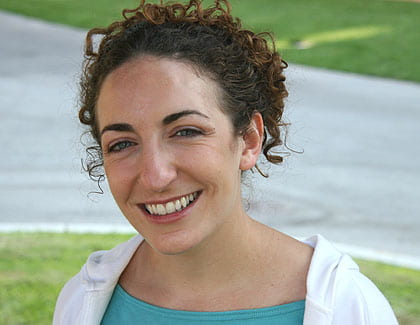Saving their skin
Medical student Jeanette Waller leads national effort to teach teens about melanoma

Joel Myres was a second-year UCI medical student when, in 2001, he discovered a lump in his abdomen. The same doctors who were his teachers made the devastating diagnosis: malignant melanoma, a recurrence of the deadly skin cancer that first appeared as a mole on Myres’s neck when he was 16.
Myres died a year later, leaving a wife, the promise of a brilliant medical career and a legacy: He inspired other medical students at UCI to educate youths about melanoma – and save lives. In 2004, they started the Joel Myres Melanoma Awareness Project, developing a curriculum and giving presentations on sun safety and skin-cancer detection to Orange County middle and high schools students. Today, the program has expanded into the National Melanoma Awareness Project, and 22 medical schools nationwide have adopted the course materials to start the project in their own communities.
“We’re trying to spread awareness of melanoma through medical students,” said Jeanette Waller, a fourth-year medical student at UCI and the national project’s founder and director. “Melanoma is preventable, and if it’s caught early and treated quickly, the chances of survival are high. We can make an impact.”
The UCI project, led by board members Waller, William Rietkerk, Jason Phillips and Ken Lam, includes about 70 volunteer medical students, undergraduates and faculty mentors. In 2005-06, they delivered their “spot a spot, save a life” message to about 5,000 local students.
They teach teens to recognize suspicious moles by learning their ABCDs: Assymetry, Border irregularity, Color variation or Change, and Diameter – any mole larger than a pencil top eraser. They also share disturbing statistics: Melanoma is the No. 1 cause of cancer deaths in women ages 20 to 30. It kills one person an hour in the U.S.
Several teens who attended the presentations have contacted the project to say they identified melanoma on loved ones.
“One of our teens e-mailed me and said she noticed a funny spot on her sister, and it turned out to be an early case of melanoma,” Waller says.
Waller learned about melanoma at an early age; her father was a dermatologist. She did a science fair project on skin cancer in the eighth grade. Her interest in the disease became personal when a college-aged friend – who had long complained of an unsightly mole on her neck – died of melanoma.
In 2005, Waller received the national Alpha Omega Alpha Medical Honor Society’s Medical Student Service Project Award for her work on the project. She’s applying for a dermatology residency next year in the hope that, as a doctor, she’ll help people prevent and fight melanoma.
“This cause is close to my heart,” she says.
